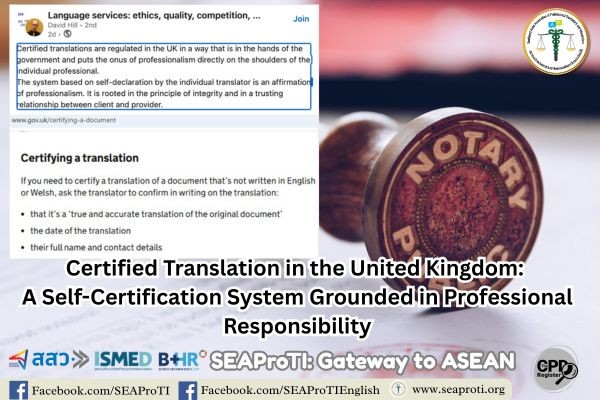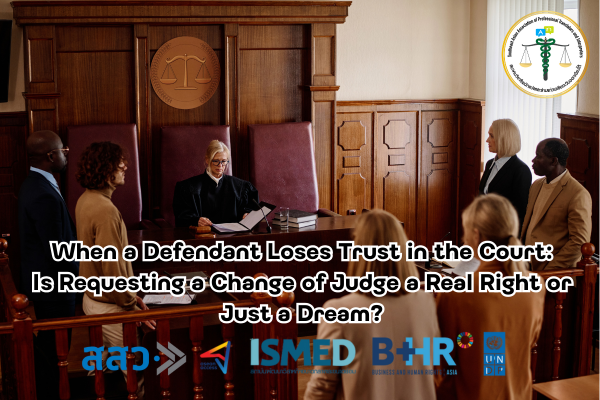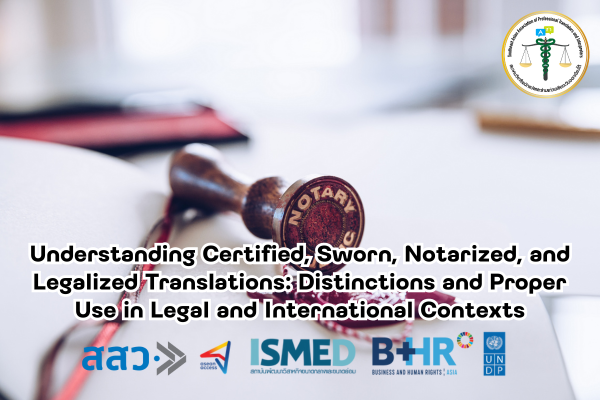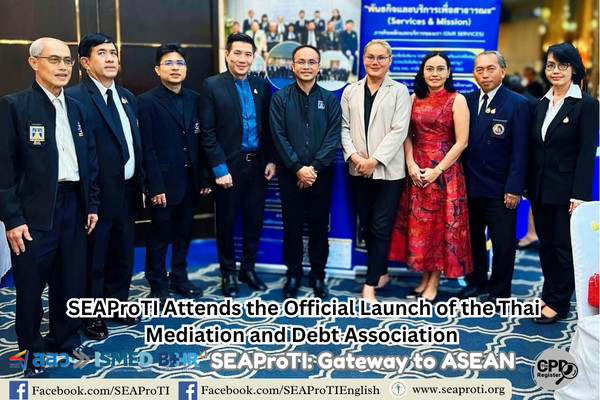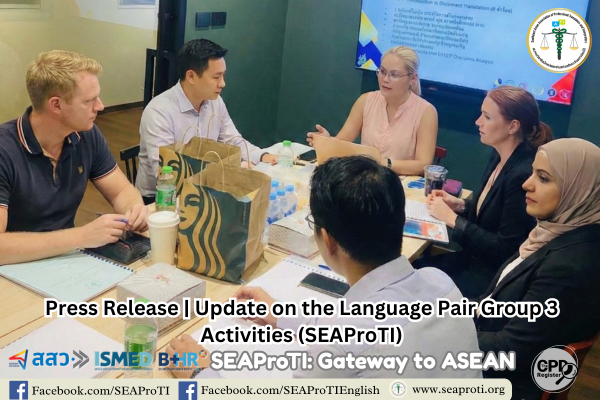Certified Translation in the United Kingdom: A Self-Certification System Grounded in Professional Responsibility
17 November 2025, Bangkok — Certified translation plays a crucial role in legal matters, immigration, education, and cross-border transactions. Many countries rely on state-licensed translators to directly regulate quality and ensure accountability. The United Kingdom, however, adopts a distinctly different approach. Its certification framework is built on professional integrity and individual accountability, rather than state licensing or formal authorisation.
This article explains the structure, requirements, and underlying principles of the UK’s certification system, and contrasts it with licensing-based regimes to highlight differences in legal and professional frameworks.
Absence of State Licensing: A Structural Principle
The United Kingdom does not issue “translator licences” or “certified translator permits,” unlike countries such as Germany, Spain, or Thailand. The UK government simply stipulates that any competent translator may certify their own work, provided the certification includes a statement of accuracy, the translator’s full name, date, and verifiable contact details (GOV.UK, 2024).
This reflects the English legal position that:
- professionals are legally accountable—civilly and criminally—for false statements; and
- a licensing regime is therefore unnecessary.
Self-Certification: The Core Mechanism
In the UK, certified translations are based on self-certification. The translator signs a declaration that the translated document is:
“A true and accurate translation of the original document.”
This statement is the heart of the certification. The translator affirms the accuracy with their own signature. In some cases, translators attach membership numbers of professional bodies to enhance credibility, though this is not required by law.
The system emphasises trust between translator and client (Hill, 2024), consistent with the common-law tradition in which honesty and professional ethics are paramount.
Role of Professional Associations: Supporting Standards, Not Mandating Them
Although the UK does not license translators, it recognises reputable professional associations such as:
- Chartered Institute of Linguists (CIOL)
- Institute of Translation and Interpreting (ITI)
These organisations establish qualification standards, ethics codes, and continuing professional development (CPD) requirements. Credentials such as Chartered Linguist (CL) carry high recognition, but membership remains voluntary, not legally required.
Thus, the UK model prioritises professional self-regulation, rather than state regulation.
UK Government Requirements for a Certified Translation
According to GOV.UK, a certified translation must include:
- a statement confirming it is a true and accurate translation,
- the translation date,
- the translator’s full name,
- verifiable contact details.
These requirements are simple, transparent, and do not mandate official stamps or state-issued seals (GOV.UK, 2024).
Comparison: United Kingdom vs. Thailand’s Licensing-Based System
| Issue | United Kingdom | Thailand (via professional associations) |
|---|---|---|
| Regulatory model | Self-certification | Licensing / professional certification |
| Licensing authority | No state licensing body | Professional association issuing licences |
| Accountability | Direct personal liability | Shared: association oversight + translator responsibility |
| Certification elements | Accuracy statement, signature, contact details | Official stamp, licence number, association-specific requirements |
The UK model emphasises personal trust and responsibility, while the Thai system focuses on credential verification and institutional oversight.
Policy Analysis: Why the UK System Works
The UK’s self-certification model functions effectively due to three major factors:
- Strong culture of professional accountability – False declarations carry serious civil and criminal consequences.
- Efficient common-law enforcement mechanisms – Government bodies can easily verify documents and pursue liability when necessary.
- Robust professional associations – Even though membership is voluntary, ethical standards and CPD frameworks reinforce high professional norms.
Thus, the system relies on “social trust + legal enforceability,” rather than licensing control.
Conclusion
The UK’s certified translation framework is highly flexible, avoiding state licensing while upholding the core principles of the profession: integrity, accountability, and public trust. It reflects a foundational belief in the translator’s direct responsibility for the accuracy of any document they certify.
Self-certification is therefore not a weakening of standards—it is a system aligned with legal tradition, professional culture, and the autonomy of translators as independent practitioners.
References
David Hill. (2024). Language services: ethics, quality, competition… [LinkedIn post]. LinkedIn.
GOV.UK. (2024). Certifying a document. https://www.gov.uk/certifying-a-document
Chartered Institute of Linguists (CIOL). (2024). Membership and chartership standards.
Institute of Translation and Interpreting (ITI). (2024). Professional conduct and membership requirements.
About Certified Translators, Translation Certifiers, and Certified Interpreters of SEAProTI
The Southeast Asian Association of Professional Translators and Interpreters (SEAProTI) has formally announced the qualifications and requirements for registration of Certified Translators, Translation Certification Providers, and Certified Interpreters in Sections 9 and 10 of the Royal Gazette, published by the Secretariat of the Cabinet, Office of the Prime Minister of Thailand, on 25 July 2024 (Vol. 141, Part 66 Ng, p. 100). Certified Translators, Translation Certification Providers, and Certified Interpreters
The Council of State has proposed the enactment of a Royal Decree, granting registered translators and recognized translation certifiers from professional associations or accredited language institutions the authority to provide legally valid translation certification (Letter to SEAProTI dated April 28, 2025)
SEAProTI is the first professional association in Thailand and Southeast Asia to implement a comprehensive certification system for translators, certifiers, and interpreters.
Head Office: Baan Ratchakru Building, No. 33, Room 402, Soi Phahonyothin 5, Phahonyothin Road, Phaya Thai District, Bangkok 10400, Thailand
Email: hello@seaproti.com | Tel.: (+66) 2-114-3128 (Office hours: Mon–Fri, 09:00–17:00)
การรับรองการแปลในประเทศอังกฤษ: ระบบ Self-Certification และหลักวิชาชีพที่ยึดโยงด้วยความรับผิดชอบ
17 พฤศจิกายน 2568, กรุงเทพมหานคร – การรับรองการแปล (certified translation) เป็นกระบวนการสำคัญในงานด้านกฎหมาย การย้ายถิ่นฐาน การศึกษา และธุรกรรมระหว่างประเทศ หลายประเทศใช้ระบบ “ผู้แปลที่ได้รับใบอนุญาตจากรัฐ” (state-licensed translators) เพื่อควบคุมคุณภาพโดยตรง แต่สหราชอาณาจักรมีแนวทางที่แตกต่างอย่างชัดเจน ระบบการรับรองการแปลของอังกฤษตั้งอยู่บน หลักการประกอบวิชาชีพโดยสุจริต (professional integrity) และ ความรับผิดชอบส่วนบุคคลของผู้แปล (individual accountability) ไม่ใช่การควบคุมด้วยใบอนุญาตจากภาครัฐ
บทความนี้อธิบายโครงสร้าง ข้อกำหนด และหลักคิดของระบบการรับรองการแปลในประเทศอังกฤษ พร้อมเปรียบเทียบกับระบบที่ใช้การออกใบอนุญาต เพื่อให้เข้าใจความแตกต่างของกรอบกฎหมายและวิชาชีพในระดับสากล
การไม่มีระบบใบอนุญาตของรัฐ: แนวคิดเชิงโครงสร้าง
สหราชอาณาจักรไม่มีหน่วยงานที่ออก “ใบประกอบอาชีพนักแปล” หรือ “ใบอนุญาตผู้รับรองการแปล” เหมือนในบางประเทศ เช่น เยอรมนี สเปน หรือไทย รัฐบาลอังกฤษกำหนดเพียงว่า ผู้แปลที่มีความสามารถ สามารถรับรองงานของตนได้ หากระบุข้อความรับรอง ชื่อเต็ม วันที่ และข้อมูลติดต่อที่ตรวจสอบได้ (GOV.UK, 2024)
- ระบบนี้สะท้อนหลักการทางกฎหมายของอังกฤษที่ว่า
- ผู้ประกอบวิชาชีพต้องรับผิดชอบต่อคำรับรองของตนในเชิงแพ่งและอาญา หากให้ข้อมูลเท็จ
- จึงไม่จำเป็นต้องมีระบบควบคุมแบบใบอนุญาต (licensing regime)
กลไก “Self-Certification”: แก่นของระบบอังกฤษ
การรับรองการแปลในสหราชอาณาจักรเป็นระบบ self-certification ผู้แปลลงนามรับรองว่าเอกสารที่ส่งมอบเป็น:
“A true and accurate translation of the original document.”
ข้อความนี้เป็นหัวใจของการรับรอง เพราะผู้แปลยืนยันความถูกต้องด้วย ลายเซ็นของตนเอง และในหลายกรณีอาจแนบหมายเลขสมาชิกของสมาคมวิชาชีพ เพื่อเพิ่มความน่าเชื่อถือ แต่ ไม่ใช่ข้อบังคับของรัฐ
ระบบดังกล่าวเน้น ความไว้วางใจระหว่างผู้ให้บริการและผู้ใช้บริการ (Hill, 2024) โดยถือว่าผู้แปลต้องรักษามาตรฐานวิชาชีพด้วยความซื่อสัตย์ ซึ่งเป็นหลักการสำคัญของ common-law tradition
บทบาทของสมาคมวิชาชีพ: เสริมมาตรฐาน แต่ไม่ใช่ข้อบังคับ
แม้รัฐไม่ได้ออกใบอนุญาต แต่สหราชอาณาจักรมีสมาคมวิชาชีพที่มีความน่าเชื่อถือสูง เช่น
- Chartered Institute of Linguists (CIOL)
- Institute of Translation and Interpreting (ITI)
สมาคมเหล่านี้กำหนดมาตรฐานคุณสมบัติ จรรยาบรรณ และการอบรมต่อเนื่อง (CPD) สำหรับสมาชิก ทำให้ผู้แปลที่ผ่านการรับรอง เช่น Chartered Linguist (CL) ได้รับการยอมรับอย่างแพร่หลาย แต่การเป็นสมาชิกยังคงมีลักษณะ “สมัครใจ” (voluntary) ไม่ใช่ข้อบังคับตามกฎหมาย
ด้วยเหตุนี้ ระบบอังกฤษจึงยืนอยู่บนฐานของ การกำกับตนเองของวิชาชีพ (professional self-regulation) มากกว่า การกำกับโดยรัฐ (state regulation)
ข้อกำหนดของรัฐบาลอังกฤษสำหรับเอกสารรับรองการแปล
เว็บไซต์ GOV.UK ระบุองค์ประกอบที่ต้องมีในงานแปลที่ได้รับการรับรอง ได้แก่:
- ข้อความรับรองว่าเป็นการแปลที่ถูกต้องและครบถ้วน
- วันที่ของการแปล
- ชื่อเต็มของผู้แปล
- ข้อมูลติดต่อของผู้แปลที่ตรวจสอบได้
| ประเด็น | อังกฤษ | ไทย (ผ่านสมาคมวิชาชีพ) |
|---|---|---|
| รูปแบบการควบคุม | Self-certification | ระบบใบอนุญาต / การรับรองโดยสมาคม |
| หน่วยงานที่กำกับ | ไม่มีหน่วยงานรัฐออกใบอนุญาต | สมาคมออกใบอนุญาตตามข้อบังคับวิชาชีพ |
| ความรับผิดชอบ | ผู้แปลรับผิดชอบโดยตรง | ขึ้นกับระบบกำกับของสมาคม + ผู้แปล |
| องค์ประกอบการรับรอง | ข้อความรับรอง การลงชื่อ และข้อมูลติดต่อ | ตราประทับ เลขที่ใบอนุญาต และข้อกำหนดเฉพาะของสมาคม |
ระบบอังกฤษให้ความสำคัญเรื่อง ความเชื่อถือส่วนบุคคล ขณะที่ระบบไทยเน้น การตรวจสอบคุณสมบัติโดยองค์กรวิชาชีพ
วิเคราะห์เชิงนโยบาย: ทำไมระบบอังกฤษจึงยืนอยู่ได้
ระบบ self-certification ดำเนินได้ดีในอังกฤษด้วยปัจจัยสำคัญ 3 ประการ:
- วัฒนธรรมความรับผิดชอบทางวิชาชีพสูง: การให้ข้อมูลเท็จเป็นความผิดที่มีโทษเข้มงวด
- กลไกตรวจสอบได้ง่ายในระบบกฎหมาย common law: หน่วยงานรัฐสามารถตรวจสอบย้อนหลังและเรียกร้องความรับผิดได้ทันที
- บทบาทของสมาคมวิชาชีพเข้มแข็ง แม้ไม่ใช่ข้อบังคับ: ทำให้ผู้แปลยึดมาตรฐานจรรยาบรรณโดยสมัครใจในระดับสูง
จึงกล่าวได้ว่าระบบอังกฤษตั้งอยู่บน “social trust + legal enforceability” มากกว่าการควบคุมด้วยใบอนุญาต
บทสรุป
การรับรองการแปลในประเทศอังกฤษเป็นระบบที่มีความยืดหยุ่นสูง โดยไม่อาศัยใบอนุญาตจากภาครัฐ แต่ตั้งอยู่บนหลักการสำคัญของวิชาชีพ ได้แก่ ความซื่อสัตย์ ความรับผิดชอบ และความไว้วางใจ ระบบดังกล่าวสะท้อนความเชื่อพื้นฐานของอังกฤษว่า ผู้ประกอบวิชาชีพต้องเป็นผู้รับผิดชอบโดยตรงต่อความถูกต้องของงานที่ตนลงนามรับรอง
ระบบ self-certification จึงไม่ใช่การลดมาตรฐาน แต่เป็นระบบที่เชื่อมโยงกับโครงสร้างกฎหมาย วัฒนธรรมวิชาชีพ และความรับผิดชอบของผู้แปลในฐานะผู้ประกอบวิชาชีพอิสระ
เอกสารอ้างอิง
- David Hill. (2024). Language services: ethics, quality, competition… [LinkedIn post]. LinkedIn.
- GOV.UK. (2024). Certifying a document. https://www.gov.uk/certifying-a-document
- Chartered Institute of Linguists (CIOL). (2024). Membership and chartership standards.
- Institute of Translation and Interpreting (ITI). (2024). Professional conduct and membership requirements.
เกี่ยวกับนักแปลรับรอง ผู้รับรองการแปล และล่ามรับรองของสมาคมวิชาชีพนักแปลและล่ามแห่งเอเชียตะวันออกเฉียงใต้
สมาคมวิชาชีพนักแปลและล่ามแห่งเอเชียตะวันออกเฉียงใต้ (SEAProTI) ได้ประกาศหลักเกณฑ์และคุณสมบัติผู้ที่ขึ้นทะเบียนเป็น “นักแปลรับรอง (Certified Translators) และผู้รับรองการแปล (Translation Certification Providers) และล่ามรับรอง (Certified Interpreters)” ของสมาคม หมวดที่ 9 และหมวดที่ 10 ในราชกิจจานุเบกษา ของสำนักเลขาธิการคณะรัฐมนตรี ในสำนักนายกรัฐมนตรี แห่งราชอาณาจักรไทย ลงวันที่ 25 ก.ค. 2567 เล่มที่ 141 ตอนที่ 66 ง หน้า 100 อ่านฉบับเต็มได้ที่: นักแปลรับรอง ผู้รับรองการแปล และล่ามรับรอง
สำนักคณะกรรมการกฤษฎีกาเสนอให้ตราเป็นพระราชกฤษฎีกา โดยกำหนดให้นักแปลที่ขึ้นทะเบียน รวมถึงผู้รับรองการแปลจากสมาคมวิชาชีพหรือสถาบันสอนภาษาที่มีการอบรมและขึ้นทะเบียน สามารถรับรองคำแปหฟลได้ (จดหมายถึงสมาคม SEAProTI ลงวันที่ 28 เม.ย. 2568)
สมาคมวิชาชีพนักแปลและล่ามแห่งเอเชียตะวันออกเฉียงใต้ เป็นสมาคมวิชาชีพแห่งแรกในประเทศไทยและภูมิภาคเอเชียตะวันออกเฉียงใต้ที่มีระบบรับรองนักแปลรับรอง ผู้รับรองการแปล และล่ามรับรอง
สำนักงานใหญ่: อาคารบ้านราชครู เลขที่ 33 ห้อง 402 ซอยพหลโยธิน 5 ถนนพหลโยธิน แขวงพญาไท เขตพญาไท กรุงเทพมหานคร 10400 ประเทศไทย
อีเมล: hello@seaproti.com โทรศัพท์: (+66) 2-114-3128 (เวลาทำการ: วันจันทร์–วันศุกร์ เวลา 09.00–17.00 น.


